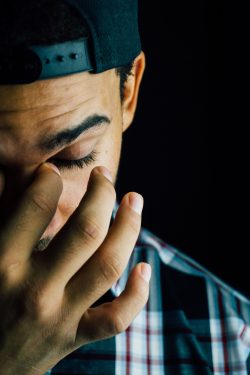Opioid Addiction
Opioid addiction is very serious and can result in painful and deadly consequences. No matter how you start off taking opioids, there is a potential for opioid addiction as the drugs can be habit-forming. However, the abuse of opioid drugs (whether illicit or prescription) is what leads to opioid addiction.
If you or someone you love is addicted to opioids, call 800-466-0354 ( Who Answers?) now to find treatment help.
What is Opioid Addiction?
According to the NIDA, “addiction… is distinguished by compulsive drug seeking and use despite sometimes devastating consequences.” Someone may start out by using opioids recreationally or by taking them as prescribed by his or her doctor. Somewhere along the way, the use of the drug may start to harm the individual more than it helps. The compulsive need to continue taking the drug is the strongest sign of addiction.
Abuse vs. Addiction
Someone who is abusing opioids might not necessarily be addicted to them yet. While many people do abuse opioids and believe that they are fine, it is difficult to recognize the signs of addiction before you are already addicted. And even then, many people still cannot see it. Sometimes, another person will tell you that you may be in danger of addiction, but you will likely not want to believe it.
The NLM states how abuse of an opioid drug can lead to addiction. If a person is abusing a drug (taking it in higher quantities or more regularly than prescribed, without a prescription at all, or using it for recreational purposes in high amounts), he or she will start with:

Opioid addiction happens when you lose control over your use of opiate drugs.
- Experimental use
This usually “involves peers” and the person does the drug(s) for recreational use. - Regular use
The person ups his or her usage of the drug, “may change friends to those who are regular users,” and is better able to “‘handle’ the drug” by developing a tolerance. - Problem or risky use
The user becomes apathetic toward school, work, and other aspects of life, “has obvious behavior changes,” may begin to take harder drugs to balance out tolerance, and will want to think about drugs more than anything else. - Addiction
The user “cannot face daily life without drugs,” denies that there is a problem, deteriorates physically, and all problems (work, family, social, school, and legal) become worse.
What are the Symptoms of Opioid Addiction?
Opioid addiction has many symptoms as can become obvious quickly to the friends and loved ones of the addicted person. The problem is that the user cannot often see him or herself in the way that others can. Symptoms of opioid addiction include:
- Secretiveness and paranoia about others finding out the depth of one’s addiction
- Using opioids even when no one is around
- Continuing to take opioids even though their euphoric effects are no longer strong just to avoid withdrawal symptoms
- Being or feeling unable to control your use of opioids
- Taking several different types of opioids that were not prescribed to you
- Feeling confused, angry, or depressed often, and especially when not taking opioids
- Forgetting to eat, shower, or take care of certain responsibilities due to your opioid use
- Making excuses for your opioid use
- Becoming hostile when someone confronts you about your abuse of opioids
- Apathy toward school, work, and other responsibilities
Why Does Addiction Occur?
Many people realize that their drug abuse is beginning to harm them, but they will continue to keep taking opioids. The NIDA states that “while the path to drug addiction begins with the voluntary act of taking drugs, over time a person’s ability to choose not to do so becomes compromised.” Addiction is a “brain disease” that changes the way the brain functions; the longer a person abuses drugs, the more susceptible he or she becomes to addiction.
This is why addicts cannot often stop, even when they want to. They may experience terrible issues as a result of their addictions, but they usually feel compelled to continue taking drugs. This can sometimes be the hardest part to understand, and it is why addicts need specialized treatment.
Issues Caused by Addiction
Here are some of the issues that can be caused by addiction to opioids:
- A desire to try more dangerous, more potent drugs like heroin
- Legal issues (ex. arrests, DUIs)
- Work-related issues (ex. getting penalized for being late or not showing up, getting fired)
- School-related issues
- Decreased life satisfaction (ex. apathy, depression)
- Health problems (ex. respiratory depression, “infection of heart lining and valves” in the case of heroin) (ISATE)
- Overdose
- Relationship problems
- Family problems
Many people find that their families are torn apart by their addictions, and some relationships can never be mended, even after rehabilitation. The hope is that amends can be made, but it is not always the case.
It is also common for people to die from addiction to opioids. Addiction and a high tolerance can result in a person taking too much of an opioid drug and overdosing. This can be fatal due to the severe respiratory depression that often occurs.
Am I Addicted to Opioids?
If you are wondering whether or not you might be addicted to opioids, ask yourself these questions:

If you become depressed when you don’t have opioids, you’re likely addicted.
- Do I continue to seek out opioid drugs even when it is dangerous to me?
- Do I become very angry, upset, or depressed when I cannot take opioids?
- Am I hiding my opioid use from my friends and family?
- Do I feel compelled to do opioids?
- Have I experienced severe problems in the past year (legal, school or work-related, or relationships that have become compromised) which are due to my use of opioids?
- Am I unhappy unless I am taking opioids?
- Have I moved from taking a low-intensity opioid to taking a high-intensity one (like heroin) or more than one?
- Do I neglect my responsibilities in order to abuse opioids?
- Will I continue to take opioids in spite of all these problems?
The last question is the most important to ask yourself and to answer truthfully. If you realize that you will continue to take opioids after all of the problems they have caused you, make sure you seek treatment immediately. You should not feel as if you have to fight your addiction alone as treatment for opioid addiction and withdrawal “involves supportive care and medications” as well as behavioral therapies (NLM).
We can help you find the treatment you need; call 800-466-0354 ( Who Answers?) today!